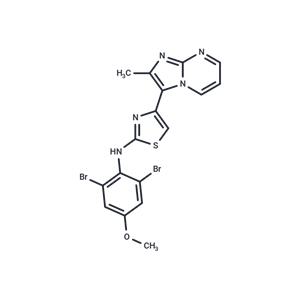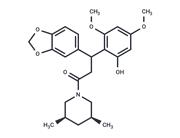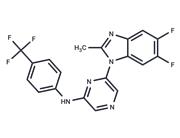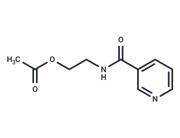| Name | PTC-209 |
| Description | PTC-209 is a potent and selective BMI-1 inhibitor. |
| Cell Research | To determine whether pretreatment with the inhibitor affects tumor cell growth, cells are plated with the inhibitor for 4 d in vitro and plated in limiting doses in vitro without adding further inhibitor. Trypan blue exclusion is used to count viable cells. The in vitro sphere-initiating cell frequency is calculated after inhibitor treatment by evaluating the number of wells containing spheres. For the experiments where LDAs are set up following recovery of PTC-209 treated cells, 6-well plates were seeded with 1E6 cells per well and incubated overnight. Cells are subsequently treated for 4 d in triplicate with either DMSO vehicle or PTC-209 (0.01, 0.1, 1 and 10 μM). Drug treatments are washed off and 4 mL fresh suspension medium added to all wells. To assess cell viability following the 4 d treatment window, cells are trypsinized and counted at 0, 24, 72 and 120 h after removal of the drug. Long-lasting effects of the drug treatment on sphere-forming ability are assessed by plating LDAs (50,000, 10,000, 1,000,100, 10 and 1 cell per well) using the cells obtained 120 h after the 4-d drug treatment.(Only for Reference) |
| Kinase Assay | Untranslated region-mediated luciferase reporter expression: HEK293 cells are transfected with a GEMS reporter vector that contains the luciferase open-reading frame flanked by and under post-transcriptional control of the BMI-1 5′ and 3′ UTRs. The resulting stable cells (F8) are treated with PTC-209 or vehicle control overnight, and then luciferase reporter activity is determined using Bright-Glo assays. The assays are run in triplicate for each point, and the percentage of inhibition was calculated against vehicle control. |
| In vitro | PTC-209 effectively reduces the frequency of functional colorectal cancer cancer-initiating cells (CICs) in vivo. Administered at a dosage of 60 mg/kg/day subcutaneously (s.c.), PTC-209 significantly inhibits the production of BMI-1 in tumor tissues and halts the growth of pre-established tumors in mice with primary human colorectal cancer xenografts, as well as in xenografts from human colorectal cancer cell lines LIM1215 or HCT116. |
| In vivo | PTC-209 irreversibly inhibits the growth of colorectal cancer initiating cells (CIC) by targeting BMI-1, resulting in the destruction of these cells. It suppresses UTR-mediated reporter gene expression and endogenous BMI-1 expression in human colorectal HCT116 cells and human fibrosarcoma HT1080 tumor cells. Furthermore, PTC-209 reduces the growth of rectal tumor cells in a BMI-1 dependent manner. |
| Storage | Powder: -20°C for 3 years | In solvent: -80°C for 1 year | Shipping with blue ice. |
| Solubility Information | Ethanol : 9.9 mg/mL (20 mM)
DMSO : 50 mg/mL (100.97 mM), Sonication is recommended.
|
| Keywords | tumor | PTC-209 | lung | Inhibitor | inhibit | HEK293T | colon | CICs | cells | cancer-initiating | breast | Autophagy | anti-myeloma |
| Inhibitors Related | Stavudine | Aceglutamide | Sodium 4-phenylbutyrate | Hydroxychloroquine | Guanidine hydrochloride | Taurine | Valproic Acid | Curcumin | Paeonol | Naringin | Salicylic acid | Gefitinib |
| Related Compound Libraries | Anti-Colorectal Cancer Compound Library | DNA Damage & Repair Compound Library | Target-Focused Phenotypic Screening Library | Bioactive Compound Library | Autophagy Compound Library | Inhibitor Library | NO PAINS Compound Library | Anti-Aging Compound Library | Bioactive Compounds Library Max | Cell Cycle Compound Library | Anti-Cancer Compound Library | Anti-Cancer Active Compound Library |

 United States
United States



